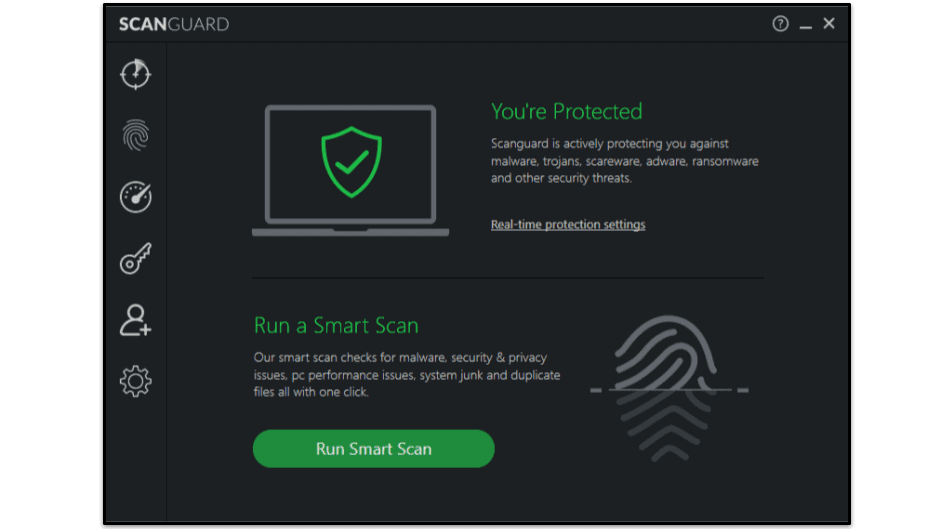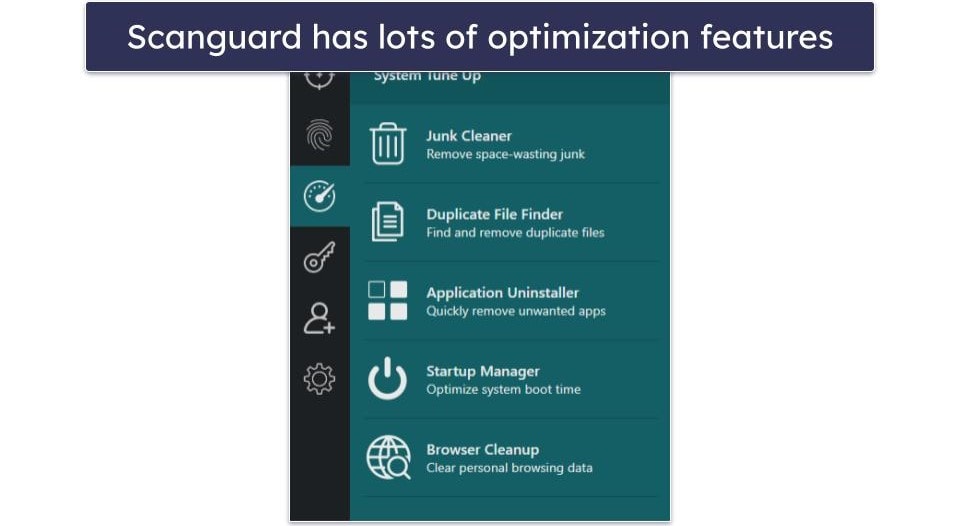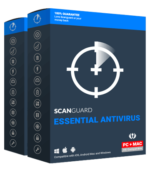Scanguard Review: Quick Expert Summary
Scanguard has flawless malware detection rates and offers a range of useful security tools. It performed well throughout my testing, protecting me from dangerous websites and a wide range of malware.
In addition to real-time malware and phishing protection, Scanguard comes with extras including a disk cleaner, a data breach scanner, a password vault, and a browser cleaner. Scanguard also offers an ad blocker, identity theft insurance, and a VPN, but these are only available as add-ons offered at checkout.
Unfortunately, Scanguard’s add-on features are quite expensive, and it would probably make more sense for users to buy better standalone products instead. For example, the VPN costs about as much as CyberGhost VPN (one of our highest-rated standalone VPNs) but doesn’t offer the same high speeds. I also found it pretty bothersome that Scanguard advertises some of these features as part of the premium antivirus plan, even though you have to purchase them separately.
Scanguard is covered by a 30-day money-back guarantee for annual subscribers. You can also test most of its features out for yourself by making use of the 8-day free trial.
| 🏅Overall Rank | #38 out of 71 antiviruses |
| 🔥 Firewall | ❌ |
| 🌐 VPN | ✅ (paid add-on) |
| 🎁 Free Plan | ✅ |
| 💵 Pricing | $29.00 / year |
| 💰 Money-Back Guarantee | 30 days |
| 💻 Operating Systems | Windows, Mac, Android |
Try Scanguard (30 Days Risk-Free)
Scanguard Full Review — Flawless Malware Detection + Good Extras Inside an Intuitive Interface

Scanguard is an effective antivirus with an intuitive interface. Even if you’ve never used an antivirus, I doubt you’ll have any issues finding and using any of Scanguard’s features. It makes use of a lot of the same technology as TotalAV (which happens to be one of my favorite antiviruses in 2024).
The scanner and real-time protection detected 100% of malware in my tests, and the optimization tools freed up space on my computer and enhanced its performance.
The premium version of Scanguard costs $29.00 / year and comes with a 30-day money-back guarantee. Unfortunately, several features (including the VPN and ad blocker) are only available as paid add-ons.
Scanguard Plans & Pricing — Simple Pricing Plans (1 Free Plan + 1 Paid Plan)
Scanguard has 1 free plan and 1 premium plan. The paid version (Essential Antivirus) comes with most of the features I’ve discussed above. This simple pricing structure is complicated a little bit by the fact that the VPN, ad blocker, and identity theft protections are paid add-ons that you can pick up at checkout.
The free plan comes with basic system clean-up tools and a limited version of the malware scanner. It freed up a bit of space on my hard drive, but the bulk of Scanguard’s optimization tools are paywalled. That said, it detected and removed most of the malware I tested it against (though I did endure a few pop-ups prompting me to upgrade to the premium version). The biggest issue is that it lacks real-time protection, meaning you’re only safe if you run regular scans. I’d feel safer using Avira’s free antivirus.
Scanguard’s paid plan, Essential Antivirus ($29.00 / year) covers up to 4 PC, Mac, or Android devices. More device licenses can be added from the store for an extra fee.
Essential Antivirus improves on the free version in various ways. It uses the newest version of the anti-malware engine and comes with real-time protection to keep you safe from the latest threats. You also get improved optimization tools and a basic password manager. There are a few features that are only available as add-ons (and Scanguard isn’t shy about promoting them).
Scanguard’s paid plan is covered by a 30-day money-back guarantee. Here’s a quick overview of both plans:
| Free Plan | Essential Antivirus | |
| Platforms | PC, Mac, iOS | PC, Mac, iOS |
| Price | Free | $29.00 / year |
| Number of device licenses | 1 | 5 |
| Malware scanning & removal | ✅ | ✅ |
| Real-time protection | ❌ | ✅ |
| Ransomware protection | ✅ | ✅ |
| Web protections | ✅ | ✅ |
| Wi-Fi protection | ❌ | ✅ |
| Ad blocker |
❌ | ❌ (Available as a paid add-on) |
| Password manager | ❌ | ❌ |
| VPN | ❌ | ❌ (Available as a paid add-on) |
| System Tune-up Tools | ✅ | ✅ |
| Password Vault | ❌ | ✅ |
| Data Breach Checker | ✅ | ✅ |
| Disk Cleaner | ✅ | ✅ |
Overall, I don’t think Scanguard offers a good value. The antivirus by itself is reasonably priced, but if you pick up any of the various add-ons, the picture is a bit different. I prefer comprehensive antivirus bundles over Scanguard’s pricey à la carte approach. For example, Norton 360 Deluxe offers much better features, including a VPN, advanced dark web monitoring, performance optimization tools, and more, while costing far less than Scanguard’s antivirus and add-ons.
Scanguard Security Features — Perfect Malware Detection, Decent Web Protection & More
Malware Scanner — Excellent Performance (Powered by Avira)

Scanguard uses the same antivirus engine as Avira (one of my favorite antiviruses in 2024) to deliver real-time malware scanning and on-demand antivirus scans.
You can choose between 4 types of scans:
- Quick scan. Scans currently running processes, temporary files, and browser files in under 2 minutes.
- System scan. Performs a full scan of your device.
- Smart scan. Quickly scans and finds suggestions to improve system performance.
- Custom scan. Allows particular drives, files, or folders to be scanned.
All the scans worked great in my tests. The system scan was relatively quick (it took just over one hour), and the quick scan was completed in under 2 minutes. Scanguard found all of the test malware samples I had hidden throughout my device.
In addition to active scans, Scanguard comes with real-time malware protection. This is designed to block you from downloading harmful files and opening malicious programs. These protections work well, even identifying suspicious zipped files.
I’d put Scanguard’s malware protections up there with the best antiviruses available in 2024. However, brands like Norton and Bitdefender offer the most powerful malware protections, along with added extras like specialist ransomware protections.
WebShield — Good Protection Against Malicious + Low Trust Sites

During my tests, WebShield stopped me from accessing most malicious sites, including verified phishing sites listed on PhishTank. However, it didn’t stop me from accessing every malicious site. In comparison, Bitdefender’s web protections are much better, catching every malicious page I tried visiting.
As part of its web protection, Scanguard also offers a free web extension for Chrome, Edge, Firefox, and Safari called Scanguard Safe Site. Once installed, it integrates WebShield directly into your browser. In addition to blocking dangerous sites, you can also use it to speedily clear your browser history, remove tracking cookies, and block unwanted browser notifications.

I was rather pleased with Scanguard’s ad and tracker blocker for Chrome, Firefox, and Edge. It’s part of the Safe Site extension but is only available if you buy the AdBlock Pro upgrade. It worked well during my tests, blocking over 20 ads and tracking links within the first 15 minutes of using it. Overall, I was impressed by how effective it is, but I’d like to see Scanguard develop extensions for other browsers as well.
Overall, Scanguard’s web protections are good, but not perfect. They detected the majority of dangerous sites I tried to visit, but a few slipped past their defenses.
Password Vault — Basic Password Vault (Not as Good as Standalone Password Managers)

Scanguard’s Password Vault is a standard password manager with decent security. It’s easy to set up, and it integrated seamlessly with my browsers. However, to install the web browser extension and enable the auto-fill and auto-save features, you need to have Scanguard’s desktop app installed first.
Scanguard’s Password Vault also includes a password generator that creates secure passwords using a mix of characters, numbers, and symbols.
But apart from some very basic customization options, there isn’t much more to this password manager. The lack of two-factor authentication (2FA) options means that it can never be as secure as the best of its competitors. I’d also like to see password sharing, note saving, and secure file storage. The auto-save and auto-fill function works well, but that’s about it.
Overall, Scanguard’s offering is nowhere near as good as standalone password managers like 1Password or Dashlane, both of which include a wide range of additional features like advanced 2FA, breach monitoring, secure password sharing, and more.
System Tune-Up — Great Range of Optimization Tools (Worked Well in My Tests)

Scanguard offers numerous system tune-up tools, including:
- Junk Cleaner.
- Duplicate File Finder.
- Application Uninstaller.
- Startup Manager.
- Browser Cleanup.
The Junk Cleaner allowed me to clear nearly 500 MB of unnecessary files in under a minute. I also used the Duplicate File Finder to get rid of some unwanted copies, including duplicate photographs that had been adding unnecessary clutter to my photo gallery. It marked several of my photographs as duplicates that were actually just very similar, so I recommend quickly reviewing the list of files before deleting them.
Scanguard’s browser cleanup extension is called Scanguard Clean & Speed Up. It can help you clear your browsing and download history, cookies, and junk files from your browser, speed up the loading of websites, and put idle tabs to sleep, thereby reducing CPU usage and memory consumption. It worked well for me, clearing up junk and speeding up page load in seconds.
While the available tools function really well, I would like to see Scanguard offer a few more. Unlike some similar services (TotalAV, for example), Scanguard’s System Tune-Up doesn’t include disk optimization tools like a disk usage analyzer.
I would also like to see some sort of performance-boosting tools, like Norton’s Game Booster (which improves system performance while gaming) or Avira’s System Speedup Pro (a huge range of tools to improve overall system performance, including startup times).
Having said that, Scanguard’s tools worked well throughout my testing. Each feature was easy to use and worked quickly to help tune up my system.
Safe Browsing VPN (Virtual Private Network) — Solid VPN With Good Security, but It’s Too Expensive to Recommend

Scanguard’s Safe Browsing VPN provides a surprisingly good experience for browsing and streaming. I just wish it came bundled with the antivirus. If getting a VPN with antivirus protection is a priority for you, you should consider TotalAV. It comes with the same VPN as Scanguard (the two products are owned by the same company) but provides a better range of features — making it our top antivirus program with a VPN in 2024.
With this in mind, Scanguard’s VPN has industry-standard features, such as browsing data encryption and a kill switch, which cuts you off from the internet if the VPN goes down, ensuring you’re not online without its protection. To connect to the internet through Scanguard’s VPN, you can choose between two protocols: IKEv2 and OpenVPN.
Scanguard’s VPN also provides users with access to 100+ servers in Europe, the Americas, Africa, and Asia. This is a decent number of servers to choose from, comparable to some premium standalone VPNs, like ExpressVPN, for example.
I ran a series of tests, comparing my speeds without a VPN to the results I got while connected to local and distant VPN servers. Here are my results.

Generally, the speeds held up well, and I didn’t have any trouble watching content on streaming services like Netflix, Amazon Prime, and Disney+. The VPN also supports torrenting (but only on servers outside the US).
But the major issue I had with the VPN was the price. It was more expensive than the antivirus suite itself! While the service works well, it costs as much as CyberGhost VPN but doesn’t have as many features.
All in all, Safe Browsing is a solid VPN that delivers security and good speeds even on distant servers. However, because of the high price I can’t really recommend it.
Identity Theft Protection — Decent Identity Monitoring + $1 Million Identity Theft Insurance

Scanguard offers a decent range of identity theft protection features. Though they aren’t included with the antivirus, US-based users can pick them up at checkout as a paid add-on. The package includes dark web monitoring, social media monitoring, identity restoration, lost wallet assistance, and up to $1 million in identity theft insurance. It’s also great for families, since 1 plan lets you monitor the identities of up to 10 people.
I like the dark web monitoring, which allows you to scan the dark web and various data brokers for your personal information, including your password and social security number. It works in the background and alerts you whenever it discovers any of your data lingering in the internet’s darkest corners.
Scanguard can also monitor your social media accounts. If you turn this option on, Scanguard will alert you if it detects suspicious activity on your accounts. For example, I shared my phone number over Facebook and Scanguard immediately scolded me with an alert that let me know I was sharing personally identifiable information (PII). It’s easy to set up and once it’s turned on, it operates entirely in the background.
If you’re the victim of identity theft, Scanguard has live agents who will help you with the remediation process. You can also use the $1 million in identity theft insurance to help recover stolen funds. It’s backed by Experian (one of the major credit bureaus), so it’s trustworthy.
The Data Breach Checker monitors the dark web for any of your login credentials. This feature works well, alerting me to the fact that details about several of my accounts were involved in massive hacks.
It’s a little pricey, but identity monitoring tools can be pretty expensive across the board. While I’ve nagged Scanguard for its expensive add-ons a lot, its identity protection add-on isn’t actually too bad. I still think Norton offers a better deal and comes with more dynamic dark web monitoring tools, but Scanguard’s tools are a fair deal.
Scanguard Ease of Use & Setup — Easy-to-Use Desktop Apps (Very Similar to TotalAV)

Scanguard uses an intuitive interface with a sidebar that makes finding all of its tools and features very straightforward. The sidebar is split into the following categories:
- Malware Protection.
- Internet Security.
- System Tune Up.
- Password Vault.
- Family Sharing Accounts.
- Settings.
I had the Windows app installed in under 3 minutes by following the installation wizard’s instructions and had no issues. I tested what was offered on the free plan before upgrading to the paid plan. The tools included with the paid plan were made available to me immediately (though extras like the VPN took a few minutes to become available after purchasing them separately).
The settings tab is well-organized, allowing users to easily customize each feature. While it may take a bit of time to fully understand each setting, it’s very easy to adjust each one to suit your needs. I really liked the scan scheduling settings, which allowed me to customize almost all aspects of the scan, including start and end time, scan type, and even the type of files for which the anti-malware engine scans.

My biggest issue is with the website itself. I found outdated information about plans, features, and apps. This includes listing plans that are no longer offered, dead links, and the Contact Us button taking you to an FAQ instead of a contact form. The plans page also really makes it seem like you’ll get the ad blocker with the Essential plan, but the reality is that it’s an add-on that you need to pay extra for.
Overall, Scanguard’s desktop apps are very easy to use. With features ranging from antivirus scans to a data breach checker, it could be easy for things to feel cluttered. However, even with a good amount of customization options available for each feature, I never felt confused or overwhelmed by the interface. The website is a bit confusing, but it’s manageable.
Scanguard Mobile App — Decent Android App (But No iOS Version)

Scanguard only offers a mobile app for Android (there’s no iOS app available). I tested the Android app using my Samsung Galaxy device and I was generally happy with how well it worked. The app has an easy-to-navigate, albeit somewhat busy, interface, and I didn’t encounter any glitches throughout my testing.
Figuring out how to download the app was a bit tricky. Since it doesn’t meet Google’s current requirements, it’s not available on the app store. Even Scanguard’s website uses outdated links to the Play Store, so you could be forgiven for thinking that the Android app just doesn’t exist anymore. But you can still find the .APK file in the website’s help center. Just be warned that since it’s not from the Play Store, Google will flag it as being potentially unsafe.
Many features available on the desktop apps have been well integrated into the Android app, such as the malware scanner, VPN, and junk cleaner. Each of these features worked just as well as they did for my Windows tests.
However, some competitors offer features that are notably missing from Scanguard’s mobile apps. For example, Scanguard’s app doesn’t include spam and fraud call alerts, scam SMS message filtering, or VPN (all of which are included with Norton’s Android app).
Overall, I found Scanguard’s Android app to be about as good as its desktop version. I didn’t experience any glitches or slowdowns, and the integrated features all worked well, but installing it is a hassle, and not everyone is comfortable installing .APKs that aren’t from the Play Store. This app was also easy to use, but I much prefer Norton’s antivirus app, as it offers many more features and support for both Android and iOS devices, plus it’s easier to set up.
Scanguard Customer Support — Unresponsive Email Support & Basic FAQs

Scanguard’s customer support left me unimpressed. You have to visit the official website where you’ll find an email address you can send your queries to in the homepage footer. I sent Scanguard an email with a few questions, but I never received any answers.
Then there’s the Help Center, where you’ll find the answer to your question — but only if it’s so basic you probably already know the answer. The FAQs and video tutorials do offer some helpful info, but I couldn’t find some of the answers I was looking for (I still don’t know what protocols the VPN uses).
Upon calling the phone support, I found out that it was only for billing issues. The option for tech support led to a message advising me to send an email, after which the call ended automatically.
All of that complaining aside, the live chat is ok (when it’s available). There’s no easy way to find it though — I had to Google “Scanguard live chat,” and click through a few links to find it.
The representative I talked to was polite, but a lot of what they said ended up not being correct and it took further research to learn the answer. For example, I was told that the free antivirus will detect malware but that it won’t actually remove any threats. Later, a different rep said that it does eliminate viruses (which I confirmed with my own tests).
Scanguard’s customer support is pretty bad overall, particularly if you need technical advice. I never received a response to my email. I might have had a better experience if I opted to pay extra for premium support, but that option felt overpriced. I do like that all customers get access to live chat support, but the hours are limited and the reps weren’t very knowledgeable about their own products.
Is Scanguard a Good Antivirus Program in 2024?
Scanguard is an okay antivirus with some good but overpriced add-on features. Even without any add-ons, it’s still pretty expensive. The anti-malware engine and WebShield are undoubtedly great tools for keeping you safe online, but the price isn’t exactly competitive. You can get a lot more for your money by trying another premium antivirus program, like Norton or Bitdefender.
That said, Scanguard still offers decent malware and web protections. Its malware scanner is powered by the same technology that TotalAV uses. The scanner was able to eliminate every piece of malware I tested it against, while the real-time protection proved effective at blocking threats before they could deploy.
Scanguard’s Safe Browsing VPN worked great during my testing, but it’s very overpriced (it’s only available as a paid add-on). The VPN allowed me to connect to various global locations while maintaining good enough speeds for browsing and streaming, but it costs about the same as many standalone VPNs that offer better features and faster speeds.
I was also disappointed with the customer support. The FAQ and knowledge base are pretty bare bones. And while I like that there’s live chat, it’s strangely difficult to find and the representatives I talked to weren’t very knowledgeable about Scanguard.
Overall, there are much better antiviruses on the market. Alternatives like Norton and Bitdefender offer many more features, like dark web monitoring, advanced ransomware protections, and cloud-based scanning, all for much less than the price of Scanguard’s paid plan.
Frequently Asked Questions
Is Scanguard safe?
Scanguard is a legitimate brand that provides antivirus software and other internet security tools (it’s owned by the same company as TotalAV and PCProtect). All of its products are safe to use, from its antivirus to its system cleanup tools. In fact, its antivirus even uses the same trusted anti-malware engine as Avira (one of our top-rated antiviruses).
Scanguard’s web protections are also effective at blocking malicious websites, including phishing pages. During my tests, it performed better than Chrome’s built-in protections. Though it’s a bit expensive, there’s no question that Scanguard is safe to use.
Does Scanguard have extensions?
Scanguard offers a free extension called Scanguard Safe Site that works with Chrome, Firefox, and Edge. It can protect you from potentially dangerous phishing sites. It also integrates AdBlock Pro to stop ads and trackers, though this is a paid add-on.
However, some antivirus services include good ad blockers as part of their plans and not as a paid add-on feature. Bitdefender Total Security is a good example of this and is covered by a 30-day money-back guarantee so you can try it before you buy.
Scanguard also provides an extension called Scanguard Clean & Speed Up, which can be installed for free on Chrome, Firefox, Edge, and Safari. It helps you declutter and speed up your browser by clearing up your browsing and download history, as well as tracking cookies.
Can I use Scanguard for free?
Scanguard can be used for free in a very limited capacity. The free version only offers free malware scanning and some basic junk cleaning tools. Every other feature is paywalled, meaning free users don’t get access to any of the additional features like real-time malware protection, VPN, password manager, system tuneup tools, etc. You can also try out the premium version by doing a 30-day free trial (no payment details required).
Is Scanguard the same as TotalAV?
Scanguard is owned by the same company as TotalAV. Scanguard uses the same Avira anti-malware engine as TotalAV and several other services sold by the same company, including the VPN, ad blocker, and password manager.
These services are very similar with almost identical interfaces, but TotalAV plans offer a much better value overall. TotalAV comes with more device licenses and more features than Scanguard does, making it a better option for most users.


